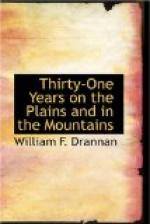I do not know just how many soldiers were sent to recover the dead bodies, but that day there was a general attack made on Captain Jack, which was kept up from day to day almost as long as the war lasted.
When it was foggy, as it was nearly all the time, the Indians almost invariably got the best of the soldiers, from the fact that they would come out without any clothing on their bodies with a bunch of sage-brush tied on their heads, and their skins being so similar in color to that of the lava rocks, that when the fog was thick, at a distance of thirty or forty yards, it was impossible to distinguish an Indian from a rock. There were more or less soldiers killed and wounded every day until the end of the war.
One day only a short time after the assassination of Gen. Canby and Col. Thomas, the soldiers were attacked in Dry Lake canyon by the Modocs and were getting badly butchered up.
As I rode along Gen. Wheaton dashed up by my side and said: “Where can those Indians be and what kind of guns have they? I have been losing men all day and there has not been an Indian seen.” I told the General I would try and locate them and let him know just where they were. Taking George Jones and another man by the name of Owens with me, I rode around on the opposite ridge, dismounted, and leaving my horse with the other boys, I crawled down among the rocks. I had on a buckskin suit and could not be seen much easier than a Modoc when in the lava beds. They kept up a continual firing, and now and then I could hear a bullet whiz near me. After I had crawled about sixty yards as cautiously as I could I raised on one knee and foot and my gun was resting across my leg while I was peering through the fog to see if I could get sight of any Indians, and listening to see if I could hear an Indian’s voice. I had remained in this position about five minutes when a ball struck me on the shin-bone, just below the boot top. It appeared to me that I could have heard it crack at a hundred yards. Never before in my life had I experienced such a miserable feeling as at that time. I thought that my leg was broken into atoms. I started to crawl back up the hill, taking the same route that I had come down, and when I had ascended the hill near enough to the boys so they could see me, George Jones saw that I was hurt.
He dropped his gun and ran to me at once and said: “Captain, are you badly hurt?” But before I had time to answer him he had picked me up bodily and was running up the hill with me.
When he got to where our horses were he said: “Where are you shot?” I said: “George, my left leg is shot off.” “What shall we do?” said George. I told him to put me on Johnny, that being the name of my horse, and I would go to headquarters. He said: “Let me pull your boot off,” at the same time taking hold of my boot. I caught my leg with both hands to hold the bones together while the boot was being removed from the leg, thinking that the bone was shattered




